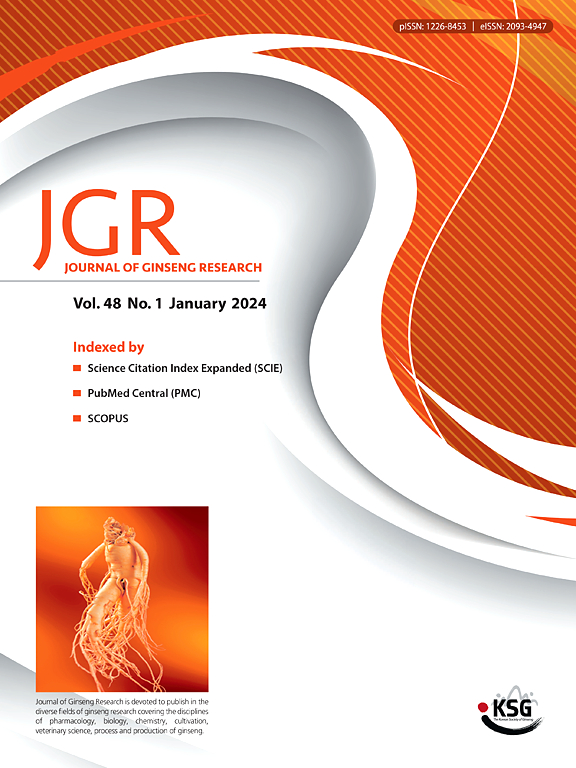Current clinical trends in developing strategies for dementia disorders and the role of Korean Red Ginseng
IF 5.6
2区 医学
Q1 CHEMISTRY, MEDICINAL
引用次数: 0
Abstract
Recently, the development of the FDA approved monoclonal antibodies (mAbs) targeting amyloid proteins, such as aducanumab, lecanemab, and donanemab, etc. Although these are in initial stage, developing mAbs is believed to proposed as next stage of AD therapeutics. However, their high cost makes them impractical as main stream of dementia treatments, and efficacies might not overcome the current AchEI (Acetyl choline Esterase Inhibitors). AchEI compliance issues are caused by side effects, such as nausea or vomiting due to Ach's adverse event. There are several categories of medicines, nootropics, functional foods that enhance cognition. These usually have used together or sometimes independently. In addition to conventional anti-AD medication, however, efficacy re-evaluation in Korea to assess which may for the physicians to prohibit further prescription.
These situations, too-high-cost of advanced new drugs, compliance issues of current medications and re-evaluation of nootropics are facing the ultra-expanding dementia population in South Korea. Korean Red Ginseng has been recognized for cognitive enhancement properties. Additionally, pleiotropic phenomena of KRG, not only cognition but also overall human health systems, warranting further underling medical evidence. These efficacies and multi-effectiveness can be a high potential candidate for the current trends in developing strategies for dementia disorders.

目前的临床趋势,发展战略的痴呆症和韩国红参的作用
最近,FDA批准了针对淀粉样蛋白的单克隆抗体(mab)的开发,如aducanumab, lecanemab和donanemab等。尽管这些尚处于初始阶段,但开发单克隆抗体被认为是阿尔茨海默病治疗的下一阶段。然而,它们的高成本使其成为痴呆症治疗的主流不切实际,而且其疗效可能无法克服目前的乙酰胆碱酯酶抑制剂(Acetyl choline Esterase Inhibitors)。乙酰胆碱合成酶的依从性问题是由副作用引起的,如乙酰胆碱的不良事件引起的恶心或呕吐。有几类药物,益智药,功能性食品可以增强认知能力。这些通常一起使用,有时单独使用。然而,除了常规的抗ad药物外,在韩国重新评估其疗效后,可能会禁止医生进一步开具处方。这些情况、先进新药成本过高、现有药物的依从性问题以及益智药的重新评估都是韩国急剧扩大的痴呆症人口所面临的问题。韩国红参被认为具有增强认知能力的特性。此外,KRG的多效性现象,不仅是认知,而且是整个人类健康系统,需要进一步的医学证据。这些功效和多效性可以成为当前发展痴呆症策略趋势的高潜力候选物。
本文章由计算机程序翻译,如有差异,请以英文原文为准。
求助全文
约1分钟内获得全文
求助全文
来源期刊

Journal of Ginseng Research
CHEMISTRY, MEDICINAL-INTEGRATIVE & COMPLEMENTARY MEDICINE
CiteScore
11.40
自引率
9.50%
发文量
111
审稿时长
6-12 weeks
期刊介绍:
Journal of Ginseng Research (JGR) is an official, open access journal of the Korean Society of Ginseng and is the only international journal publishing scholarly reports on ginseng research in the world. The journal is a bimonthly peer-reviewed publication featuring high-quality studies related to basic, pre-clinical, and clinical researches on ginseng to reflect recent progresses in ginseng research.
JGR publishes papers, either experimental or theoretical, that advance our understanding of ginseng science, including plant sciences, biology, chemistry, pharmacology, toxicology, pharmacokinetics, veterinary medicine, biochemistry, manufacture, and clinical study of ginseng since 1976. It also includes the new paradigm of integrative research, covering alternative medicinal approaches. Article types considered for publication include review articles, original research articles, and brief reports.
JGR helps researchers to understand mechanisms for traditional efficacy of ginseng and to put their clinical evidence together. It provides balanced information on basic science and clinical applications to researchers, manufacturers, practitioners, teachers, scholars, and medical doctors.
 求助内容:
求助内容: 应助结果提醒方式:
应助结果提醒方式:


